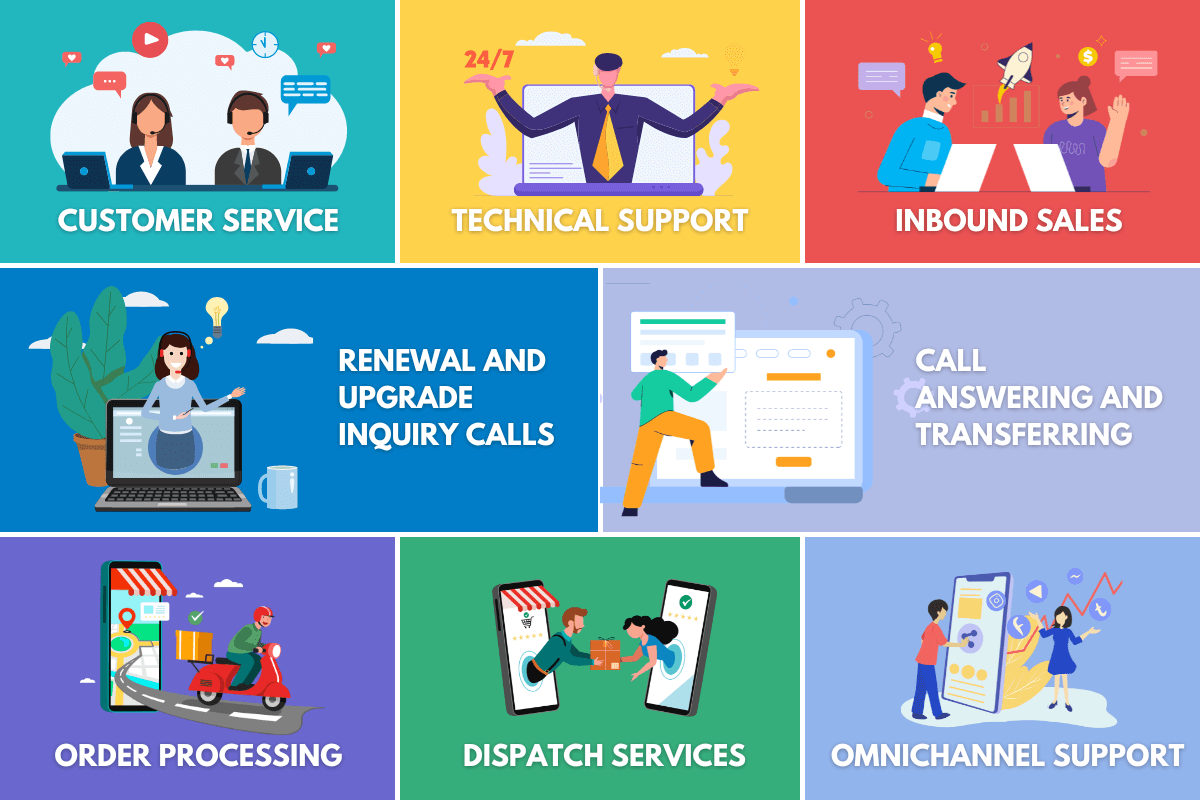Written by Allie Delos Santos
Contents
Businesses must provide round-the-clock support, multilingual proficiency, and additional skills in addressing customer concerns in this digital era. Understanding what inbound call center outsourcing is and what it does helps you determine the optimal solution for your business.
This long guide defines what inbound call center business process outsourcing (BPO) is and explains how you can use it to your advantage.
What Is Business Process Outsourcing?

Business process outsourcing (BPO) is when an organization contracts with an outside service provider to perform certain company functions. An organization typically hires a BPO company to manage services that are necessary to operations but are not part of its core business.
Many companies outsource tedious or time-consuming processes or functions beyond their expertise. For instance, an eCommerce company can outsource its inbound call center to focus on product selling.
Because commodity processes generally do not differentiate companies from one another, leaders find more value in outsourcing them than in hiring full-time employees. Alternatively, outsourcing certain processes, such as call centers, is easier than building one from the ground up. Business process outsourcing delivers better results.
What Is Inbound Call Center Outsourcing?
Inbound call center outsourcing is the process of delegating customer service to an outside entity instead of establishing an in-house call center. An inbound call center answers incoming calls from customers. Its primary responsibility is to handle all inbound calls from clients, answer questions, troubleshoot, and receive complaints. Agents troubleshoot service or product issues with the caller.
Over the years, industries such as banking, insurance, telecommunications, travel, and tourism, have benefited from outsourced inbound call centers.
The call center business process outsourcing sector is still growing. According to Technavio, the industry will grow by 3.2% from 2019 to 2023. This growth trend in call center outsourcing is evident in North America.
Types of Outsourcing

Location is one type of outsourcing. There are three types of outsourcing based on location: local, offshoring, and nearshoring.
Local Outsourcing
Local outsourcing involves hiring providers located in your home country. This type of outsourcing offers many advantages:
- The provider is within the same time zone.
- You have similar cultures.
- Collaboration and overseeing the provider’s activities are easier.
- You can easily fix problems.
These advantages sound reassuring and promising, but the costs can be a disadvantage.
The cost of living in regions such as the U.S. or Western Europe tends to be high, thus corresponding to the high hourly rates of call center agents. The average rate of call centers in the U.S. is $26 to $65 per hour.
If you decide to invest in this type of call center outsourcing, note that the high fees do not guarantee good service quality. The chances of something going wrong are almost the same as anywhere else.
Offshore Outsourcing
Offshore call center outsourcing is when a call center taking your firm’s incoming calls is located abroad, often in Asia or Europe. Despite its popularity, there are a few things to consider about offshoring.
The advantages of this approach include:
- Low rates. Hourly rates for inbound call centers in some countries are as low as $5 to $10. BPO companies can offer such low rates due to the low labor costs in the country.
- Wider talent pools. Offshore locations have as wide and deep a talent pool as any other region.
- Multiple time zones. If you have customers from other time zones, catering to them becomes easier when you have a 24/7 call center provider.
There are also disadvantages to offshoring that you must keep in mind.
- Risk of miscommunication. The location of your third-party call center makes it harder to collaborate, resulting in potential miscommunication.
- Poor service quality. The standards for quality in some offshore locations can be poor, thus affecting the service you receive.
Nearshore Outsourcing
Nearshore outsourcing involves hiring service providers from nearby locations. For instance, a U.S. eCommerce shop can outsource its inbound call center to Mexico or Central America.
Nearshoring offers several benefits, such as:
- Potentially low costs. Some nearby countries offer lower labor costs than your home country.
- Ease of collaboration. Considering proximity and similar time zones, collaboration is easier with nearshoring. You and your provider might also have similar cultures.
Like all other call center outsourcing models, nearshoring also has disadvantages. One major disadvantage is the potentially limited talent pool. Another is the possibly higher costs than offshore providers.
Services That Inbound Call Center Outsourcing Provides

Now that you know what BPO is explore the services it offers.
The services of third-party inbound call centers focus on customer support. Their duties include getting customer information through phone calls, identifying the caller’s eligibility for certain resolutions or programs, and explaining product descriptions or policies.
Call centers are also responsible for tracking client interaction, maintaining call equipment, and following company standards in customer relations.
Here’s a closer look at the services call center business process outsourcing offers.
Customer Service
Customer service involves responding to client calls concerning a product, a service, or account management. This service includes answering questions about practices and policies, processing returns and over-the-phone payments, collecting customer feedback, updating client information, and more.
In most cases, customer service addresses concerns electronically, and many call centers play recordings while clients are on hold, directing them to relevant online resources.
Technical Support
Technical support involves calls from customers about issues with specific technology products. Whether a laptop that won’t turn on or a mobile device that can’t receive calls, technical support agents interact with customers who are unhappy about technology products.
Due to the nature of these calls, inbound agents who manage technical support must be patient, level-headed, and capable of handling demands and complaints. You can address all concerns with the right outsourcing team, encouraging repeat sales and strengthening brand loyalty.
Inbound Sales
In some cases, inbound call centers receive calls from potential shoppers who want to know more about a product or service. These are inbound sales calls, and expert agents can take advantage of this opportunity.
Salesmanship and tact are essential here. Showing a welcoming and polite face for the brand can turn a lead into a paying customer.
During an inbound sales call, the agent must first build rapport with the potential customer, offering useful information and establishing common ground. They must also ask open-ended questions, let the potential buyer lead the conversation, and be transparent to get the prospect’s trust.
Some bigger companies have a third-party call center dedicated to inbound sales instead of mixing several call types into one. In this case, the call center has agents who specialize in sales, enabling you to offer high-quality service. Partnering with a reliable provider for inbound sales calls allows you to achieve positive business process outsourcing results.
Renewal and Upgrade Inquiry Calls
This call center service involves clients who have decided to upgrade, combine, or renew their subscription plans. Customers who are happy about the type of service they get decide to continue the relationship. Agents who manage this service must be familiar with the brand’s entire product line, the benefits of upgrading or retaining plans, and ongoing promotions.
In addition to providing knowledgeable agents, an outsourcing provider helps you train representatives to process the upgrade or renewal themselves or help the callers by connecting them to the appropriate sales agent for plan expansion.
Order Processing
After receiving a call from a potential client, the inbound call center processes the order. Order processing includes recording the buyer’s information, explaining the purchase options, and collecting payment information.
Call center outsourcing helps process international orders and shipments within time zones outside your typical office hours. It also helps manage overflow during high-traffic seasons such as the holidays.
Dispatch Services
A dispatch center receives calls, transfers them as necessary, and keeps track of the progress of deliveries and shipments. Outsourcing this function allows companies to pay for agents on an as-needed basis instead of hiring full-time salaried employees.
Call Answering and Transferring
Third-party call centers can act as an answering service, with agents picking up and transferring calls from customers. The agent asks the caller about the purpose of the call and transfers them to the necessary party.
Omnichannel Support
Omnichannel support offers multichannel solutions and improves customization and coordination. Different agents or departments assigned to the same customer can easily coordinate using one source of information gathered through phone calls or other platforms. Outsourcing omnichannel support allows you to customize your customer service approach and generate better results.
Ways to Use Inbound Call Center Business Process Outsourcing

Call center outsourcing allows businesses to offer high-quality customer support. Building an in-house call center is time-consuming, and businesses with a tight budget and limited resources cannot afford it.
But outsourcing call center services to a BPO provider allows you to cost-effectively match the quality of big enterprises’ and market leaders’ customer service, no matter your company’s size.
Here are more ways your business can capitalize on outsourced call center services:
- Gather customer documents, details, and requirements. You can analyze information gathered from the call center’s interactions with your clients. Since most call centers have speech and voice recognition features, they can identify spoken phrases, analyze the voice and tone of customers, and recognize their emotions.
- Initiate the training process: Outsourced call center providers train their staff to familiarize them with your company’s customer relationship management (CRM) system and tools. This training allows their agents to understand your workflow just like your employees. They also document training processes step by step.
- Assign tasks to the right agents: After knowing your customer support process, the call center screens customer service representatives for cultural fit and starts delegating responsibilities to the appropriate people within the outsourcing program.
- Prepare mock calls and training assessment: Mock calls are part of the training process that the provider will assign to the candidates. In this step, the provider vets its agents according to their performance under certain metrics. These metrics include support quality, timeliness, resolution time, friendliness, and more.
- Calibrate for quality: Outsourced call center quality assurance is a process that ensures that client interactions align with your organizational goals and standards. Quality calibration determines common customer issues, enhances the experience, and standardizes communication processes across all touchpoints.
- Conduct regular reviews and assessments: Most call center outsourcing providers conduct regular evaluations to improve the quality of service. They keep communication with the clients open to fill gaps.
Companies and Industries That Outsourced Inbound Call Center

Companies that use inbound call center business process outsourcing have one thing in common: they understand the importance of building and fostering good customer relationships.
A front-end call center can directly influence your relationship with customers. Call centers are not part of a business’s main functions despite their importance, so companies can instead outsource them.
Globe News Wire reports that the global call center market will reach $496 billion by 2027. This growth shows the support of various sectors in using call center outsourcing.
Many industries can benefit from using an inbound call center. Below are a few examples.
Healthcare
Providing patients with high-quality customer service in the medical industry is crucial. A third-party inbound call center can benefit many healthcare providers by answering patient calls, scheduling appointments, answering billing questions, and managing other administrative tasks.
Having a dedicated call center can reduce the workload of medical providers and improve patient care.
Financial Services
Financial service companies often receive high call traffic because customers need assistance with several tasks, such as transferring money and opening accounts. A third-party inbound call center can help these businesses because they navigate high call volumes and provide good customer support.
Here are some examples of financial service companies that outsource inbound call center services:
- Bank of America is one of the Big Four financial institutions with outsourced customer support that is offshored. The functions provided by its non-bank subsidiary include HR management, tech services, and inbound call center services.
- Wells Fargo & Company is the fourth-largest bank globally. It offshored outsourcing operations in 2011. Outsourced tasks include call center services and IT. Outsource agents help U.S. clients with credit card concerns and other collection services.
- Capital One is an American bank holding company that outsourced call center roles offshore for automation. In 2013, it developed customer service and inbound call center training program with an offshore company. It opened another technical support and customer service office three years later.
Retail
Retail organizations should provide customers with a stellar shopping experience and excellent customer service; the competition is tight. A HubSpot research shows that 93% of consumers are more likely to repeat purchases from brands that provide exceptional customer service.
Inbound call center outsourcing can help take customer orders, answer questions, resolve complaints, and process returns or refunds. Additionally, inbound call centers can boost sales by providing product assistance.
Ultimately, any retail or eCommerce business will benefit from having a team of dedicated inbound call center agents who handle customer interaction well.
A prominent example of ecommerce and retail companies using call center outsourcing include:
- Amazon: In 2019, the technology and ecommerce company opened two dedicated call centers offshore. These call centers provide support and offer 24-hour customer service to clients in North America and the UK.
- Target: This general merchandise store offers curated food assortments and general merchandise at discounted prices. This merchandise company has call center operations offshore.
Travel and Transportation
Almost everyone needs public transportation for their daily commute. Similarly, traveling to another city, state, or country requires trains, buses, or airplanes.
Therefore, transportation and travel companies need the help of third-party inbound call centers to answer questions and give their commuters complete information about their modes of transportation. Additionally, truck rental services and automobiles also use call centers for changing trip details or canceling reservations.
Restaurant and Food Services
Hotels, restaurants, and food services can win their client’s trust by providing good customer service. Outsourcing lets customers place an order through a phone call and track their orders’ delivery time.
A dedicated inbound call center can also assist in gathering valuable feedback to refine the restaurant business plan, helping owners make informed decisions to enhance their operations based on customer reviews
Telecommunications Companies
Telecommunications companies don’t have the same advantage as other organizations. Their customers are likely to reach them over the internet or the phone. They are less likely to build a strong relationship with their clients, making good customer service vital for this sector.
Outsourcing allows telecommunications companies to optimize customer support service and ensure business success. Call center business process outsourcing helps these companies build longer-lasting relationships with customers and improve their brand loyalty and satisfaction.
A third-party call center can do more than simply resolve customer complaints. Telecommunications providers can use call center outsourcing as a proactive approach to marketing their brand and services.
Take a look at the list of telecommunications companies that use process outsourcing:
- AT&T is a telecommunications company specializing in internet and phone services, wireless and data communication, and satellite and IP-based television. As part of its cost-saving strategies, it transferred most of its call center operations to low-cost offshore countries.
- Verizon is another company that offshored its inbound call center. Having operations in more than 150 locations, the media company provides internet connectivity, wireless network services, and data services.
- Telstra believes that call center outsourcing process means better customer service. Due to the better technologies, unique innovation, and 24/7 operations of offshore call centers, Telstra received better assistance in efficient processing.
- Comcast is a telecommunications company based in Philadelphia. They provide telephone services, cable television, and home internet services. Even after returning most support jobs to the U.S., they continue to outsource supplementary customer service functions, managing seasonal call traffic.
Other companies that outsource customer service and other call center services include:
- LinkedIn is a professional California-based networking platform. It outsources its customer service and sales functions to third-party providers.
- The Wall Street Journal is a global business-oriented newspaper headquartered in New York City. Its daily circulation includes 2.834 million broadsheet copies and its digital format, making it the biggest newspaper company in the U.S. This company outsources its call center functions offshore for inbound customer retention.
- Hootsuite, established in 2008, is an international leader in social media management, serving more than 18 million clients. It decided to outsource its call center to scale up operations.
- Google recognizes the benefits of outsourced call center services. Its decision to outsource email and phone support for Google Ads reaped a positive return on investment (ROI) for the company.
Reasons You Need Inbound Call Center Outsourcing

Companies can use BPO for long-term planning, and this is just one reason to hire a third-party call center. Below are the top ten reasons you need to consider this business strategy.
1. Cost-effectiveness
With a third-party call center as your partner, you don’t need to hire in-house employees or invest in a workspace. Desks, phones, computers, and other office supplies are not cheap, nor is the time spent training call center agents.
An outside call center comes prepared. It trains agents to manage customer complaints. Plus, it already has the necessary resources to answer customer calls from day one.
2. Reliability
Customer service management becomes more challenging when your agents get bogged down by one customer call after another. Customers want an immediate response and know they can easily get it elsewhere. Your agents have less time to respond to each client.
Highly trained call center agents can place hundreds of calls daily and reduce response time. An in-house call center might struggle with this. Third-party call centers can serve as a safety net to supplement work that your in-house employees cannot perform.
3. Better Monitoring Capability
Nearly all reputable call center providers have monitoring procedures that allow their clients and in-house managers to track every call answered and placed. By recording calls and conducting regular quality assurance checks, service providers can guarantee that agents manage calls to the best of their ability.
4. Flexibility
A third-party call center has various schedules for its team to ensure that a heavy workload does not overwhelm the agents. Flexible hours can benefit your company. You are closed for specific hours, but your call center partner can have agents available to take calls during these hours.
These agents can handle calls during the night or early in the morning before you arrive at the office. Quick response time is crucial. About 90% of customers rate immediate responses as important when they have concerns or questions.
5. Higher Customer Satisfaction
BPO providers typically have more qualified agents and longer experience. Their agents undergo training to deal with unruly and frustrated customers. Who else can handle angry customers better than highly trained and experienced call takers?
6. Access to Expertise
Outsource your inbound call center to tap into courteous and professional agents for a fraction of the cost. Call center vendors provide tried-and-tested processes. They already have extensive experience for your benefit.
A reliable service provider understands your organizational objectives and customer expectations. They can suggest appropriate strategies to boost your customer service quality while also eliminating the need to hire an in-house team and invest in training employees.
7. Access to the Newest Technology
Business process outsourcing for inbound call center services gives you access to the latest technology without shouldering additional expenses. Your selected provider will provide the necessary equipment to improve your call center operations. This is an excellent way to meet end-user expectations and use tools more effectively.
8. 24/7 Customer Support
Round-the-clock support improves customer satisfaction rates. Call center outsourcing offers professional agents available to place or answer calls on your behalf at any time of the day, even on holidays.
More importantly, 24/7 support unlocks the possibility of entering the global market. Marketing your products and services is no longer restricted to a single location. You can pitch sales to broader demographics, target a global audience, and promote a new release in areas your competitors can’t reach.
9. Focus on Core Responsibilities
Small businesses tend to exhaust their employees with multitasking. Call center outsourcing keeps your company focused on core operations. These primary functions include distribution, production, and sales.
With a third-party workforce working with your company, you don’t have to worry about customer service agents managing too many calls. Your in-house team handles high-level support issues, while your call center partner handles frequently asked questions (FAQs) and low-level tickets.
10. Improved Efficiency and Productivity
Inbound call center outsourcing is not for every organization. Still, most modern businesses benefit from hiring a third-party service provider to do the heavy lifting for their customer service team. A BPO provider can help you with recurring tasks if the workload is too much for your employees to handle.
With the help of a third-party call center, your in-house team can improve its productivity and concentrate on what they do best.
Tips for Successful Inbound Call Center Outsourcing

Outsourcing does not mean running from responsibilities. It requires monitoring and management. Call center outsourcing can be highly beneficial if you do it properly and monitor it closely. Consider the tips below for successful call center business process outsourcing.
Determine Your Outsourcing Goals
The first step in call center outsourcing is identifying your needs. Companies usually outsource inbound call center services for customer support and lead generation. Knowing your service needs and industry requirements tells you what to look for in a BPO provider—data security, rates, experience, and services.
Find a Reliable Service Provider
Find a good service provider once you identify the activities you want to outsource. Here are some factors to consider when searching for a call center vendor:
- Location: Decide whether you want a local or foreign outsourcing partner. Local call center providers tend to be costly but are easier to collaborate with and manage. Offshore outsourcing partners can be more difficult to control and monitor but have favorable pricing models.
- Rates: Establishing a budget and sticking to it are a big part of outsourcing. Your budget should be sufficient to hire a reliable provider, but make sure not to overspend since it will defeat the purpose of outsourcing. Offshore call centers charge between $9 and $16 per hour for specialized outsourcing agencies. But be aware of currency exchange rates and potentially hidden costs that can up your bill.
- Specialization: Not all call center providers are the same. Some specialize in a certain function. Pick a vendor that aligns with your needs and industry requirements. For instance, a call center specializing in eCommerce customer service might not be the best choice for healthcare companies in need of support.
- Reputation and references: Picking a provider is akin to hiring an employee. You don’t hire a candidate without a background check. Similarly, hire a vendor with credible references and past clients who can attest to its high-quality service.
- Professionalism: A call center is the first line of communication with your clients for appointment setting, conflict resolution, etc. The best call center provider can handle heated calls with professionalism, courtesy, and grace. Listening to customers voice their frustration with a caring tone goes a long way toward conflict resolution.
- Culture: Organizational culture can make or break a business. BPO providers must encourage their agents to handle negativity well, maintain tact, and answer each call with a fresh perspective. A BPO company that provides benefits and perks and encourages regular breaks can prevent agents from leaving.
- Call statistics: Check the provider’s average time before an inbound call is answered. How long do customers wait on hold before they receive support? How many calls are lost or dropped because no one has answered? Nothing frustrates customers more than waiting on hold or calls being dropped completely.
- Other services: Some BPO companies provide additional services such as back-office support and outsourced finance and accounting. Ask what other services they offer that you might need.
Draft a Contract and Define SLAs
Service level agreements (SLAs), contracts, and statements of work (SOW) ensure that you get what you need from your BPO partner. These documents outline the benchmarks and specific standards to measure performance and the service quality you expect to receive.
Explain your SLA and SOW requirements to your call center provider early on to prevent confusion and problems. The terms of engagement must be flexible, state revenue commitments, should not have minimums, and define the termination clause. Most importantly, refrain from using ambiguous language.
Make the Transition
After taking care of the SLA and contract logistics, prepare for the transition phase, where you transfer responsibilities to the BPO company.
Follow the steps below for a successful transition:
- Ensure clear communication with the third-party team. Transitions are smoother when each member is involved.
- Provide access to necessary information.
- Communicate the corporate policies your service provider must follow and the IT systems it needs to use.
- Assign a strategy manager who will coordinate the migration of responsibilities.
Regularly Monitor Your Provider’s Performance and Results
The best way to ensure the quality of your inbound call center operation is by regularly monitoring the third-party vendor’s performance and results. But this can be challenging to do if your provider is miles away.
Using performance monitoring software, hiring companies can determine how long external agents work, which tasks they work on, and how efficient they are. Work monitoring tools provide a single source of truth for agents’ work quality and productivity.
You can also set a time when in-house and third-party teams can get together to provide updates on performance and key performance indicators (KPIs). Conducting regular video calls with your third-party team also goes a long way toward maintaining rapport.
To learn more about business process outsourcing, check out this BPO learning center with materials curated by industry experts.
The Bottom Line
Inbound call center BPO means delegating the management of calls initiated by customers to a third-party service provider. The advantages of inbound call center outsourcing are plenty. Companies that outsource this function can reap higher customer satisfaction, enhance profitability, reduce operating costs, and have better sales records.
With the help of a reliable BPO provider, you can maximize the client experience by providing excellent product support and customer service.




